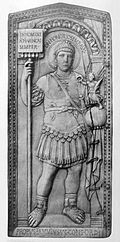Honorius (emperor)
| Honorius | |||||
|---|---|---|---|---|---|
| Emperor of the Western Roman Empire | |||||

Honorius on the consular diptych of Anicius Petronius Probus (406)
|
|||||
| Western Roman Emperor | |||||
| Reign | 23 January 393 – 15 August 423 | ||||
| Predecessor | Theodosius I | ||||
| Successor | Joannes and then Valentinian III | ||||
| Co-reign | Theodosius I (393–395) | ||||
| Born |
9 September 384 Constantinople |
||||
| Died | 15 August 423 (aged 38) Ravenna, Italia |
||||
| Spouse |
Maria Thermantia |
||||
|
|||||
| Dynasty | Theodosian | ||||
| Father | Theodosius I | ||||
| Mother | Aelia Flaccilla | ||||
| Religion | Nicene Christianity | ||||
| Full name | |
|---|---|
| Flavius Honorius (from birth to accession); Flavius Honorius Augustus (as emperor) |
Honorius (Latin: Flavius Honorius Augustus; 9 September 384 – 15 August 423) was Western Roman Emperor from 393 to 423. He was the younger son of emperor Theodosius I and his first wife Aelia Flaccilla, and brother of Arcadius, who was the Eastern Emperor from 395 until his death in 408.
Even by the standards of the rapidly declining Western Empire, Honorius's reign was precarious and chaotic. His reign was supported by his principal general, Stilicho, who was successively Honorius's guardian (during his childhood) and his father-in-law (after the emperor became an adult). Stilicho's generalship helped preserve some level of stability, but with his execution in 408, the Western Roman Empire moved closer to collapse. Honorius is widely considered as one of the worst of the emperors; it was during his reign that Rome was sacked for the first time in 800 years.
After holding the consulate at the age of two, Honorius was declared Augustus by his father Theodosius I, and thus co-ruler, on 23 January 393 after the death of Valentinian II and the usurpation of Eugenius. When Theodosius died, in January 395, Honorius and Arcadius divided the Empire, so that Honorius became Western Roman Emperor at the age of ten.
During the first part of his reign Honorius depended on the military leadership of the general Stilicho, who had been appointed by Theodosius and was of mixed Vandal and Roman ancestry. To strengthen his bonds with the young emperor, Stilicho married his daughter Maria to him. The epithalamion written for the occasion by Stilicho's court poet Claudian survives. Honorius was also greatly influenced by the Popes of Rome, who sought to extend their influence through his youth and weak character. So it was that Pope Innocent I contrived to have Honorius write to his brother, condemning the deposition of John Chrysostom in 407.
...
Wikipedia
